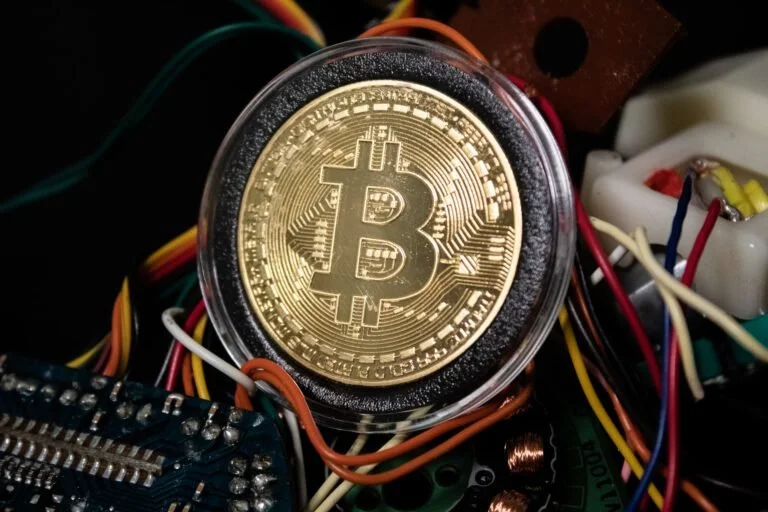Photo by Valery Tenevoy on Unsplash
The Gen-Z Series: Decoding Bitcoin 🤖 breaks down everything you need to know about Bitcoin – from the basics to the big questions – and explores the real solutions for a new generation of savers & investors!
🔗 Gen-Z Series Blog Link #Bitcoin #GenZ #Finance #Investing
A Look at Custodial Risks & The True Spirit of Bitcoin
Revolut has made buying Bitcoin incredibly easy. A few taps on your phone, and you can dip your toes into the world of decentralized finance. But convenience comes at a cost, and when it comes to Bitcoin, that cost is control. This isn't about Revolut specifically being malicious; it's about the fundamental nature of how they (and most exchanges) offer Bitcoin, and what that means for you.
You Don't Own Bitcoin on Revolut (or Most Exchanges): You Own an IOU
Let's be blunt: when you buy Bitcoin on Revolut, you don't actually own Bitcoin. You own an IOU from Revolut stating that they owe you a certain amount of Bitcoin. Think of it like a hotel holding your luggage. They have it, but you don't have physical possession.
This is called custodial Bitcoin. Revolut (or Coinbase, Kraken, Binance, etc.) holds the private keys – the critical piece of code that proves ownership – on your behalf. They are responsible for its security.
This contrasts with self-custody, where you hold the private keys. This is the core principle Satoshi Nakamoto built Bitcoin upon. You are your own bank.
The Dangers of Custodial Services
Custody isn't inherently bad for beginners, but it carries significant risks:
Exchange Hacks: Exchanges are honeypots for hackers. They hold vast amounts of cryptocurrency, making them attractive targets. If Revolut is hacked, your Bitcoin is at risk. While Revolut has security measures, no system is impenetrable.
Regulatory Risk: Revolut is subject to regulation. Regulations can change, and governments can compel exchanges to freeze assets, restrict withdrawals, or even seize funds. We've seen this happen with some exchanges and stable coins in the past.
Counter-party Risk: Revolut, as a company, could face financial difficulties or even bankruptcy. What happens to your "Bitcoin" then? It becomes a claim against the company's assets, and you're at the back of the line with all other creditors.
Loss of Keys: If Revolut loses the private keys to your Bitcoin, it's gone. There's no way to recover it without those keys.
Even ETFs Aren't Truly 'Yours'
The recent approval of Bitcoin ETFs is being hailed as a win for wider adoption. While they provide another avenue to gain exposure to Bitcoin's price, they are also custodial. You're buying shares in a fund that holds Bitcoin, not Bitcoin itself. You're exposed to the price fluctuations, but you don't have direct ownership, control, or the ability to transact on the Bitcoin network yourself.
KYC and The Erosion of Bitcoin's Purpose
The ease of use offered by platforms like Revolut often comes with Know Your Customer (KYC) requirements. You have to provide your personal information – ID, address, etc. While this is presented as a security measure, it fundamentally changes the nature of Bitcoin.
Satoshi Nakamoto created Bitcoin as a peer-to-peer electronic cash system, designed to remove intermediaries and give individuals control over their finances, free from government or bank oversight. Running to regulated exchanges, willingly submitting to KYC, and accepting custodial arrangements is, in many ways, the opposite of this vision. It's opting into a system, not opting out.
The Original Promise: Financial Sovereignty
The core idea behind Bitcoin is financial sovereignty – the ability to control your own money without permission from anyone. This isn't just about avoiding fees; it's about preserving freedom. It's about resisting censorship and having the ability to transact without third-party interference.
However, the regulations that exchanges must adhere to are actively designed to prevent you from joining a truly permissionless, censorship-resistant financial system.
Take Control: Self-Custody is the Path to True Ownership
Yes, self-custody requires more effort. It means learning about:
Bitcoin wallets: Hardware wallets are generally considered the most secure option. Consider exploring Coldcard, Jade, or Trezor. Each offers different features and security tradeoffs.
Private keys and seed phrases: (Treat these like the most valuable secret in your life – never share them!)
Understanding transactions and fees.
But the effort is worth it. When you self-custody, you are in control. You are truly the owner of your Bitcoin.
Tax Implications & Efficient Wrappers
If you do choose to use exchanges for easier access, be acutely aware of the tax implications. Trading and selling Bitcoin on exchanges is a taxable event in most jurisdictions. Failing to report these gains (or losses) can lead to penalties.
However, you can mitigate some of this tax burden by utilizing tax-advantaged accounts where available. Here are some examples from the largest countries:
United States: Roth IRA (Individual Retirement Account) – Allows tax-free growth and withdrawals in retirement.
Canada: Tax-Free Savings Account (TFSA) – Similar to a Roth IRA, offering tax-free growth and withdrawals.
United Kingdom: Individual Savings Account (ISA) – Offers various tax benefits, including tax-free capital gains.
Germany: Private Riester Pension – A government-subsidized pension plan that can offer tax benefits.
Australia: Superannuation – A compulsory retirement savings scheme offering tax concessions.
Always consult with a tax professional in your jurisdiction to understand the specific rules and regulations that apply to your situation. Ignoring tax implications is a serious mistake.
Resources to Get Started:
BTC Sessions: Zero to hero bitcoiner in one page, Stack the most relevant skills for your bitcoin journey (https://www.btcsessions.ca/learn)
What's The Problem?: The world feels like it’s heading in the wrong direction—rising costs, declining standards, and growing instability. The root cause? Our money is broken (https://www.satsvsfiat.com/)
What Bitcoin Did: YouTube channel for in-depth information about all things Bitcoin. (https://www.whatbitcoindid.com/)
Hardware Wallet Manufacturers: (Coldcard, Jade, Trezor) - research and choose one that suits your needs.
“Don't just use Bitcoin. Understand it. Don't settle for an IOU when you can hold the real thing.”
TL;DR: Is Your Bitcoin on Revolut Safe?
Don't be fooled – if you buy Bitcoin on Revolut (or most exchanges), you don't own Bitcoin. You own an IOU. Revolut holds your Bitcoin for you (custodial), which means you're trusting them with your funds and are vulnerable to hacks, regulation, and their potential failure.
True Bitcoin ownership means you control the private keys (self-custody). This requires a bit more effort – you'll need a hardware wallet like a Coldcard, Jade or Trezor – but it's the only way to achieve the original vision of Bitcoin: financial freedom from central control.
If you use exchanges, understand the tax implications and consider using tax-advantaged accounts to minimize your tax burden.
Don't settle for less than true ownership. Learn about self-custody and reclaim control of your Bitcoin.
Disclaimer
I am not a financial advisor or tax professional. This blog post is for informational purposes only and should not be considered financial or tax advice. Investing in Bitcoin is highly speculative and carries significant risk. You could lose all of your investment. Always do your own research and consult with a qualified financial advisor and tax professional before making any investment decisions.













